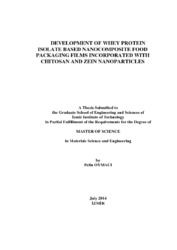Please use this identifier to cite or link to this item:
https://hdl.handle.net/11147/4171Full metadata record
| DC Field | Value | Language |
|---|---|---|
| dc.contributor.advisor | Alsoy Altınkaya, Sacide | - |
| dc.contributor.advisor | Demir, Mustafa Muammer | - |
| dc.contributor.author | Oymacı, Pelin | - |
| dc.date.accessioned | 2014-11-17T13:04:42Z | - |
| dc.date.available | 2014-11-17T13:04:42Z | - |
| dc.date.issued | 2014 | - |
| dc.identifier.uri | http://hdl.handle.net/11147/4171 | - |
| dc.description | Thesis (Master)--Izmir Institute of Technology, Materials Science and Engineering, Izmir, 2014 | en_US |
| dc.description | Includes bibliographical references (leaves: 61-68) | en_US |
| dc.description | Text in English; Abstract: Turkish and English | en_US |
| dc.description | xi, 68 leaves | en_US |
| dc.description.abstract | The purpose of this study was to investigate the effect of chitosan and zein nanoparticles addition on the barrier and mechanical properties of whey protein isolate (WPI) films as an alternative to conventional synthetic packaging materials. Chitosan nanoparticles (CSNP) were produced via ionic gelation method using sodium tripolyphosphate (TPP) and deacetylated chitosan. Zein nanoparticles (ZNP) were synthesized based on antisolvent procedure in the presence of sodium caseinate (SC) to enable dispersion in water. Both plain and nanoparticle added WPI films were prepared by solution casting method. Water vapor barrier and mechanical properties of films were measured and the improvements in these properties with nanoparticle addition was further investigated through surface wetting, morphological, viscoelastic and thermal properties of the films. Both nanoparticles significantly decreased the water vapor permeability (WVP) and improved the mechanical properties of the WPI film. The highest enhancement in barrier and mechanical properties of the WPI films were recorded with 20% (w/w of WPI) CSNP and 120% (w/w of WPI) ZNP addition which corresponded to the maximum nanoparticle loading levels. At these loadings, the average WVP of pure WPI films loaded with ZNP and CSNP decreased by 84% and 57%, and the average tensile strength increased by 304% and 161%, respectively. On the other hand, the nanoparticles did not change the elongation at break significantly. ZNP was found more effective than CSNP in improving barrier and mechanical properties of the WPI films due to its hydrophobic nature and better dispersion in the protein matrix which allowed much higher loadings compared with the maximum loading levels achieved with CSNP. CSNP addition imparted antibacterial activity to the WPI films. | en_US |
| dc.language.iso | en | en_US |
| dc.publisher | Izmir Institute of Technology | en_US |
| dc.rights | info:eu-repo/semantics/openAccess | en_US |
| dc.subject | Food packaging | en_US |
| dc.subject | Nanoparticles | en_US |
| dc.subject | Nanocomposites | en_US |
| dc.subject | Chitosan | en_US |
| dc.subject | Zein | en_US |
| dc.subject | Sodyum caseinate | en_US |
| dc.title | Development of Whey Protein Isolate Based Nanocomposite Food Packaging Film Incorporated With Chitosan and Zein Nanoparticles | en_US |
| dc.title.alternative | Kitosan ve Zein Nanotanecikler İçeren Peynir Altı Suyu İzolatı Bazlı Nanokompozit Gıda Ambalajı Filmlerin Geliştirilmesi | en_US |
| dc.type | Master Thesis | en_US |
| dc.institutionauthor | Oymacı, Pelin | - |
| dc.department | Thesis (Master)--İzmir Institute of Technology, Materials Science and Engineering | en_US |
| dc.relation.publicationcategory | Tez | en_US |
| dc.identifier.wosquality | N/A | - |
| dc.identifier.scopusquality | N/A | - |
| item.fulltext | With Fulltext | - |
| item.languageiso639-1 | en | - |
| item.openairecristype | http://purl.org/coar/resource_type/c_18cf | - |
| item.openairetype | Master Thesis | - |
| item.grantfulltext | open | - |
| item.cerifentitytype | Publications | - |
| Appears in Collections: | Master Degree / Yüksek Lisans Tezleri | |
Files in This Item:
| File | Description | Size | Format | |
|---|---|---|---|---|
| 10013586.pdf | MasterThesis | 6.32 MB | Adobe PDF |  View/Open |
CORE Recommender
Page view(s)
342
checked on Jun 10, 2025
Download(s)
280
checked on Jun 10, 2025
Google ScholarTM
Check
Items in GCRIS Repository are protected by copyright, with all rights reserved, unless otherwise indicated.